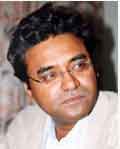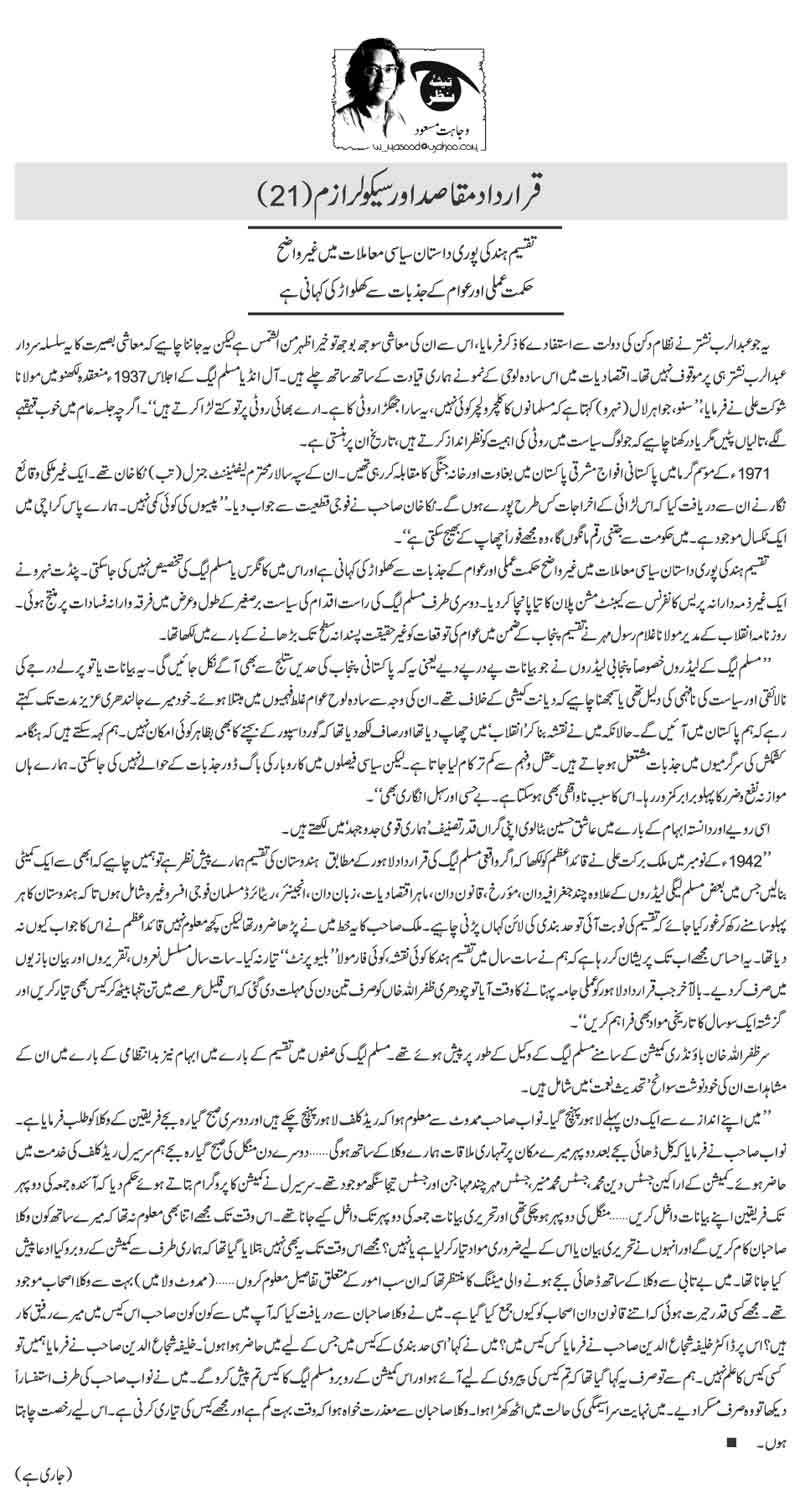
The founder of Pakistan, Mohammad Ali Jinnah, wanted a separate
country for Muslims but his political upbringing in a pluralist society
prevented him from declaring Pakistan an Islamic state. Contrary to the general
perception in India, Mr Jinnah was arguably a secular and liberal Muslim who
wanted a Pakistan where all citizens would be equal in the eyes of the
constitution irrespective of their religion, caste or creed. But leaders like
Liaqat Ali Khan and power hungry opportunistic religious leaders wanted it to be
otherwise. In this beautifully written series titled, "Objectives Resolution and
Secularism", Mr Wajahat Masood delves deep into history to find out how Jinnah's
dream of a secular and democratic Pakistan was shattered.
–Editor
“In the November of 1942 Malik Barkat Ali
wrote to Qaid-e-Azam that if our sight is indeed on the partition of India
according to the Lahore Resolution of the Muslim League, then we should form a
committee comprising of, apart from the Muslim League leaders, some geographers,
historians, legal experts, economists, linguists, engineers, retired Muslim army
officers etc. so that keeping every aspect in mind it could be decided where the
boundary line should be drawn in case of partition. I had read Mr Malik’s letter
but could not find out why Qaid-e-Azam had not replied to it. This thought still
perplexes me why we did not prepare any map, any formula or blue print for the
partition of India in seven years. We wasted seven years simply shouting
slogans, giving speeches and making statements. Ultimately when the time to
apply the Lahore Resolution arrived, Chaudhry Zafarulla Khan was given only
three days’ time to prepare the case all by himself and also gather historical
material of the last hundred years as well.” – Wajahat
Masood

By Wajahat
Masood
(Translated from Urdu by
Sohail Arshad)
The founder of Pakistan, Mohammad Ali Jinnah,
wanted a separate country for Muslims but his political upbringing in a
pluralist society prevented him from declaring Pakistan an Islamic state.
Contrary to the general perception in India, Mr Jinnah was arguably a secular
and liberal Muslim who wanted a Pakistan where all citizens would be equal in
the eyes of the constitution irrespective of their religion, caste or creed. But
leaders like Liaqat Ali Khan and power hungry opportunistic religious leaders
wanted it to be otherwise. In this beautifully written series titled,
"Objectives Resolution and Secularism", Mr Wajahat Masood delves deep into
history to find out how Jinnah's dream of a secular and democratic Pakistan was
shattered. –Editor
What Abdur Rab Nashtar said about the utility of
the wealth of Nizam of Deccan, speaks a lot about his economic wisdom. But it
should be remembered that this economic wisdom was not the intellectual property
of Abdur Rab Nashtar alone. Instances of this simplistic attitude in economics
have been a part and parcel of our leadership. In his address to the All India
Muslim League session 1937 in Lucknow, Maulana Shaukat Ali
said:
“Listen! Jawahar Lal (Nehru)
says that Muslims do not have any culture. All the fights are over bread. Let me
say that it’s the dogs who fight over bread”.
Though the audience had burst
into laughter and clapped at the remark, it should be remembered that history
laughs at those who ignore the importance of bread in
politics.
In the summer of 1971, Pakistani
Army was battling against rebellion and civil war in the East Pakistan. General
Tikka Khan was their commander. Once a foreign journalist asked him how the
expenses of the battle would be met. Tikka Khan replied with military
conviction,” There is no lack of funds. We have a mint in Karachi. Whatever
amount I ask for, the government will print and give it to
me.”
The whole story of the partition
of India is the story of vague strategy about political affairs and playing with
the emotions of the masses. The Congress and the Muslim League were no
exception. Pundit Nehru spoiled the Cabinet Mission Plan with irresponsible
press conference. On the other hand, the politics of Direct Action culminated in
communal riots across the length and breadth of the country. The editor of the
daily Inquilab Maulana Ghulam Rasul Meher has written on the raising of the
people’s expectations to unrealistic levels in connection with the division of
the Punjab. The statements the Muslim leaders, especially Punjabi leaders made
assuring people that Punjab’s borders would go beyond the Sutlej. These
statements were either manifestation of political stupidity and ignorance or
devoid of sincerity. They led to misunderstandings in the minds of general
masses. Even my friends in Jullundur had the belief that they would come under
Pakistan, though I had drawn a map and published in the Inquilab clearly showing
that even possibility of saving Gurdaspur was bleak. We can say that in chaotic
situations, emotions become unbridled and sanity takes a back seat. But while
taking political decisions, reign of affairs cannot be left to emotions. With
us, weighing the pros and cons has always been unimportant. The reason might be
our ignorance, insensitivity or complacency.”
In his acclaimed book Hamari
Jaddojehad ( Our Struggle) Ashiq Hussain Batalwi writes on this conscious
ambiguity and attitude:
“In the November of 1942 Malik
Barkat Ali wrote to Qaid-e-Azam that if our sight is indeed on the partition of
India according to the Lahore Resolution of the Muslim League, then we should
form a committee comprising of, apart from the Muslim League leaders, some
geographers, historians, legal experts, economists, linguists, engineers,
retired Muslim army officers etc. so that keeping every aspect in mind it could
be decided where the boundary line should be drawn in case of partition. I had
read Mr Malik’s letter but could not find out why Qaid-e-Azam had not replied to
it. This thought still perplexes me why we did not prepare any map, any formula
or blue print for the partition of India in seven years. We wasted seven years
simply shouting slogans, giving speeches and making statements. Ultimately when
the time to apply the Lahore Resolution arrived, Chaudhry Zafarulla Khan was
given only three days’ time to prepare the case all by himself and also gather
historical material of the last hundred years as well.”
Sir Zafarulla Khan had appeared
before the Boundary Commission as the Muslim League counsel. His observations on
the misadministration and ambiguity in the rank and file of the Muslim League
are recorded in his autobiography Tahdees-e-Nemat:
I arrived in Lahore one day in
advance according to my understanding. I learned from Nawab Sahab of Mumdoot
that Mr Radcliffe had arrived in Lahore and had instructed the counsels of the
two sides to appear at 11 am next day. Nawab Sahab told me that I would be
meeting his lawyers at his residence at 2.30 pm the following day. Next morning,
a Tuesday, we appeared before Sir Radcliffe at 11 A.M. The members of the
committee Justice Deen Mohammad, Justice Md Munir, Justice Meher Chand Mahajan
and Justice Teja Singh were present. Informing us of the Commission’s programme,
he instructed us to submit our statements by afternoon of the following Friday.
It was Tuesday afternoon and the written statements had to be submitted by
Friday afternoon. At that time I did not even know who the lawyers were who
would work with me on it and whether they had prepared the written statement or
gathered the material for it. I had not even been told what points I should
present before the Commission. I was anxiously waiting for the meeting with the
lawyers in order to get the details on all the issues. Many lawyers were present
(at Mumdoot Villa). I was surprised why so many lawyers had been roped in. I
asked the lawyers who among them were going to assist me in that case. Instead
of replying, Dr Khalifa Shujauddin asked me, “In which case?”
“In the boundary case for which
I have come here”, I replied.
Khlifa Shujauddin said,” I am
not aware of any case as such. I have been simply told that I am here to defend
the case and will pursue the Muslim League’s case before the
Commission.”
I looked askance at Nawab Saheb.
He smiled. I stood there perplexed. I took leave of the lawyers saying I had
little time to prepare for the case and left.”





 Sultan Shahin
Sultan Shahin


0 comments:
Post a Comment